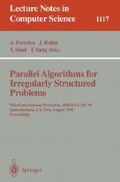Abstract
The complexity of writing sparse codes can be simplified enormously if the sparsity of matrices is dealt with at compilation level rather than at programming level. In this approach, a compiler automatically transforms a program operating 2-dimensional arrays into code that operates on sparse storage schemes.
These ideas have resulted in the implementation of a prototype compiler that is capable of automatically transforming a dense program into semantically equivalent sparse code. In this paper, we present some simple quantitative experiments that have been conducted with this sparse compiler.
Support was provided by the Foundation for Computer Science (SION) of the Dutch Organization for Scientific Research (NWO) and the EC Esprit Agency DG XIII under Grant No. APPARC 6634 BRA III
Preview
Unable to display preview. Download preview PDF.
References
Aaxt J.C. Bik. Compiler Support for Sparse Matrix Computations. PhD thesis, Department of Computer Science, Leiden University, 1996. ISBN 90-9009442-3.
Aart J.C. Bik and Harry A.G. Wijshoff. Advanced compiler optimizations for sparse computations. Journal of Parallel and Distributed Computing, 31:14–24, 1995.
Aart J.C. Bik and Harry A.G. Wijshoff. Automatic data structure selection and transformation for sparse matrix computations. IEEE Transactions on Parallel and Distributed Systems, 7(2):109–126, 1996.
Aart J.C. Bik and Harry A.G. Wijshoff. The use of iteration space partitioning to construct representative simple sections. Journal of Parallel and Distributed Computing, 34:95–110, 1996.
Iain S. Duff, A.M. Erisman, and J.K. Reid. Direct Methods for Sparse Matrices. Oxford Science Publications, Oxford, 1990.
Alan George and Joseph W.H. Liu. Computer Solution of Large Sparse Positive Definite Systems. Prentice-Hall, Englewood Cliffs, New York, 1981.
Sergio Pissanetsky. Sparse Matrix Technology. Academic Press, London, 1984.
Youcef Saad. SPARSKIT: a basic tool kit for sparse matrix computations. CSRD/RIACS, 1990.
Youcef Saad and Harry A.G. Wijshoff. Spark: A benchmark package for sparse computations. In Proceedings of the International Conference on Supercomputing, pages 239–253, 1990.
Zahari Zlatev. Computational Methods for General Sparse Matrices. Kluwer, Dordrecht, 1991.
Author information
Authors and Affiliations
Editor information
Rights and permissions
Copyright information
© 1996 Springer-Verlag Berlin Heidelberg
About this paper
Cite this paper
Bik, A.J.C., Wijshoff, H.A.G. (1996). Simple quantitative experiments with a sparse compiler. In: Ferreira, A., Rolim, J., Saad, Y., Yang, T. (eds) Parallel Algorithms for Irregularly Structured Problems. IRREGULAR 1996. Lecture Notes in Computer Science, vol 1117. Springer, Berlin, Heidelberg. https://doi.org/10.1007/BFb0030115
Download citation
DOI: https://doi.org/10.1007/BFb0030115
Published:
Publisher Name: Springer, Berlin, Heidelberg
Print ISBN: 978-3-540-61549-1
Online ISBN: 978-3-540-68808-2
eBook Packages: Springer Book Archive

